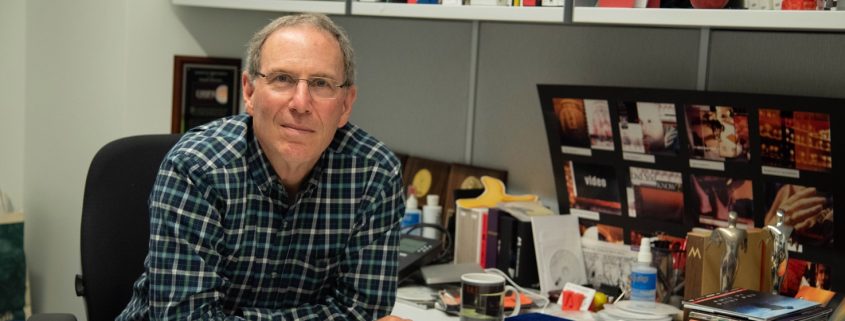Annenberg professor’s documentary leads to convict’s clemency

Cyntoia Brown, the subject of Annenberg School for Communication and Journalism Professor Dan Birman’s documentary, was granted clemency on Jan. 7. The decision by Tennessee Gov. Bill Haslam comes nearly eight years after the release of “Me Facing Life: Cyntoia’s Story.”
Brown, an alleged victim of child sex trafficking and prostitution, was arrested for murder in 2004 and sentenced to life in prison in 2006, after killing a man who she claimed paid her for sex. After hearing about her story, Birman, along with a team of students and other community members, began to work on a project documenting Brown’s life and the enslavement to a pimp referred to as “Kut Throat.”
Although she was only 16 during the incident, Brown was tried as an adult and sentenced to 60 years in prison. As of now, she has served 15 years. Following her release from prison in August, she will undergo 10 years of parole supervision.
The documentary ignited a national conversation and sparked a movement of people across the country who have called for her release, much to Birman’s surprise.
“For the first six years while I was working on the project, my fear was that we might not make a big impact, and we might not make noise, and that was a scary thought,” Birman said.
But movements like #FreeCyntoiaBrown exploded on social media, with celebrities like Kim Kardashian West and LeBron James voicing their support. Organizations such as Color of Change, The Sentencing Project and the Center on Wrongful Convictions of Youth joined efforts to support her appeal.
“One of the pillars our organization believes in is youth justice,” said Clarise McCants, criminal justice campaign director for Color for Change. “Children need to be treated like children. No child should be sentenced to serve the rest of their life in prison. Everything she’s been put through is a miscarriage of justice.”
During her time in prison, Brown obtained her GED and a degree from Lipscomb University and mentored troubled youth, according to reports by Vox and NPR. In his decision to release Brown from prison, Haslam cited Brown’s educational progress and outreach behind bars.
“Cyntoia Brown committed, by her own admission, a horrific crime at the age of 16,” Haslam said in a statement released by the governor’s office on Jan. 7. “Yet, imposing a life sentence on a juvenile that would require her to serve at least 51 years before even being eligible for parole consideration is too harsh, especially in light of the extraordinary steps Ms. Brown has taken to rebuild her life. Transformation should be accompanied by hope.”
Megan Chao, an adjunct professor at the Annenberg School for Communication and Journalism, worked as an associate producer and researcher for the documentary. She said that when she heard that Brown had been granted clemency, it hit her on a personal level.
“It was just very emotional to think that someone would have a second chance at life that wasn’t even a possibility 15 years ago,” Chao said. “I think this is a historic time for Cyntoia [and] for juvenile justice in general.”
Michael Renov, documentary expert and vice dean of academic affairs at the School of Cinematic Arts, said that Birman’s documentary is one of many to have influenced social movements.
“Documentary film, for a long time, had at least one important strand or trend within it — trying to draw public attention to some kind of injustice,” Renov said.
He said he believes that documentaries have the ability to humanize large issues, like the Brown case, in a way other mediums may not be able. Renov also said good films can shape an audience’s perception and can potentially change lives.
“Art has the power to transform,” Renov said. “It can make the familiar entirely unfamiliar and, in making it strange, it can show us [something] in a very different way. It can change the way we perceive ourselves in the world.”
Birman said that it was a “sobering thought” to see his film have such an impact.
“We caused people on platforms, young, old … to take a look at an issue with their own lens and talk about it,” Birman said. “It really gives me great hope that the form of documentary can really make a difference.”
Brown’s story also received support from Black Lives Matter organizers, who cited systemic criminal justice discrimination of black and brown people in statements voicing their support. According to a 2018 report from The Sentencing Project, black girls are 3.5 times more likely to be placed in juvenile detention.
Some criminal justice reform has occurred over the years. In 2007, 175,000 juveniles were tried as adults and, in 2014, that number dropped to just over 90,000, according to a 2017 report by the Campaign for Youth Justice. In 2018, Tennessee established the Juvenile Justice Reform Act aimed at increasing outreach to youth and reserving detention for those who committed serious crimes.
Chao and Birman are currently working on a sequel to the documentary entitled “Me Facing Life 2: Cyntoia’s Fight for Freedom.” The documentary will be a follow-up on Brown’s life, covering recent events all the way up to her release this summer.
“It is so important to pay attention to the thousands of Cyntoia Browns out there,” Birman said. “We just hope that the conversation that we started with the first documentary and that we will continue with the new documentary, will really help to illuminate new narratives in juvenile justice.”
The second documentary is expected to be released this fall.

